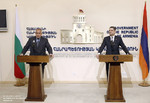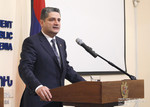Tuesday, 3 April 2012
Transcript of Joint Press Conference Of Prime Ministers Tigran Sargsyan and Boyko Borisov
Prime Minister of Armenia Tigran Sargsyan - Dear colleagues, we are honored to welcome the Bulgarian Prime Minister’s delegation to Armenia. We are convinced that this visit will open up a new chapter in the history of bilateral economic, social and political relations.
We have a deeply-rooted long history of cooperation, but today we regretfully stated our dissatisfaction with the current level of economic cooperation which should be given a strong impetus. To this end, we agreed that following the upcoming elections in Armenia, the Armenian government will have a delegation fielded to Bulgaria, including the representatives of business circles, in order to identify cooperation opportunities in terms of economic relationship. We believe that there is a good deal of untapped potential in this field and we have to open up a new chapter in our history.
Prime Minister of Bulgaria Boyko Borisov - I would like to sincerely thank our colleagues for a warm welcome. During the private talks with Prime Minister Sargsyan, we stressed that our two countries have excellent relations that are deeply-rooted in history.
We boast a good dynamics of cultural exchanges, which is not at all the case with economic cooperation. Specific steps should be taken to address the gap and push ahead with economic ties.
We have good and deep relationship between the universities to the signing of the memorandum between the two universities. As Sofia University Rector, Prof. Ivan Ilchev noticed during the signing of the memorandum of understanding, a center of Armenian studies has long been operational at Sofia University and a book on Armenian History has been released by the printing house of the University.
Despite the fact that this profession is considered to be costly in terms of finance at the University of Sofia, I think that it is an investment in our future relations and the development of
I wish to emphasize that Armenia is Bulgaria’s Black Sea neighbor and the ruling party of Armenia is an associate member of the European People’s Party, which is of great importance in the process of European integration and development.
Also, I wish to reiterate that a business-like approach has to be provided to bilateral relationship. We are prepared to host a government delegation from Armenia after the parliamentary election and hold business forum during their stay in our country. I am confident that Bulgaria can serve as a bridge to Europe for Armenia.
I would like to emphasize the strong impressions had following our visit to the Genocide Memorial of Tsitsernakaberd. We planted a memorial tree and watered the one planted earlier by the President of Bulgaria.
Armenian Public TV - Mr. Prime Minister, while stated at about USD 60 million, the annual trade turnover was said behind the pace of economic relations. In which areas do you see possibilities for expanded cooperation?
Prime Minister of Armenia Tigran Sargsyan - We discussed this issue with the Prime Minister of Bulgaria to identify such areas as may contain specific potential of cooperation. We concluded that we should promote contacts between our citizens by developing tourism as the first step.
Pharmaceutical industry was the second area in focus, considering its recent growth in both countries.
The IT sector was the third area discussed. Armenia boasts significant IT potential, including an export one. We agreed to hold a business forum in Bulgaria in order to identify specific areas of cooperation and branches.
- My question is addressed to the two heads of government. How well are bilateral relations developing in the framework of international institutions? Is there a common position?
Prime Minister of Bulgaria Boyko Borisov - We have already stated the good dynamics of bilateral cooperation within the framework of international organizations: Our party is a member of the European People’s Party, and Armenia’s ruling party is an associate member. We are actively working with international organizations in favor of Armenia’s European integration.
During our private meeting, we exchanged views on the current situation in Syria, where there is a large Armenian community. Tension is on the rise in both Damascus and Beirut. Our position is well known: it corresponds to the one adopted by the European Union, namely the Syrian regime cannot be allowed to continue with the killings of civilians.
There is an important Armenian community in the Arab countries - in the Arab world. We are concerned about their future. There are 10 million Armenians living outside the homeland, three times as much as the population of Armenia itself. We will rely on them in supporting Armenia’s economy.
Either Bulgaria has a large Armenian community. We can state positively that they are successful bankers, businessmen and cultural figures. Therefore, we believe that the country should be supported to the best interest of those Armenians living abroad. We once again express concern over the developments in Syria.
Prime Minister of Armenia Tigran Sargsyan - I would like to add that it is very important for us to learn the experience of Bulgaria in terms of European integration. We are thankful to the government of Bulgaria and the Prime Minister himself for continued support in this matter. We are interested in studying many of those reforms implemented in Bulgaria as part of its European integration. Here, I would like to thank my Bulgarian counterpart for readiness to share out the needed know-how.
Question to the Prime Minister of Bulgaria: What specific economic issues have been discussed during your meeting? Have you taken up question of visa requirements, as well as the fact that there is no direct transport communication between Armenia and Bulgaria?
Prime Minister of Bulgaria Boyko Borisov – As a matter of fact, visa requirements will have to be eased in some way since Bulgaria is a EU-member country. This may help boost business ties between our two countries. We managed to introduce more flexible visa requirements in our relationships with Russia and Turkey.
We outsourced the right to providing visa-related services in our countries. As to transport communications, we should develop a system of combined air transportations using a second destination point as it is apparently profitable to fly from Sofia to Yerevan and from Yerevan to Russia.
We ought to think of a similar flight implying a halt at one of neighboring capital towns. We stand ready to take immediate steps to that effect after the upcoming parliamentary election in Armenia considering that Armenia and Bulgaria might serve as a bridge from Europe to Caucasus and the East and vice versa.
We would like to develop additional traveling opportunities in our countries. We see great prospects for the development of cultural tourism as we believe that our countries could offer such an interesting opportunity.










